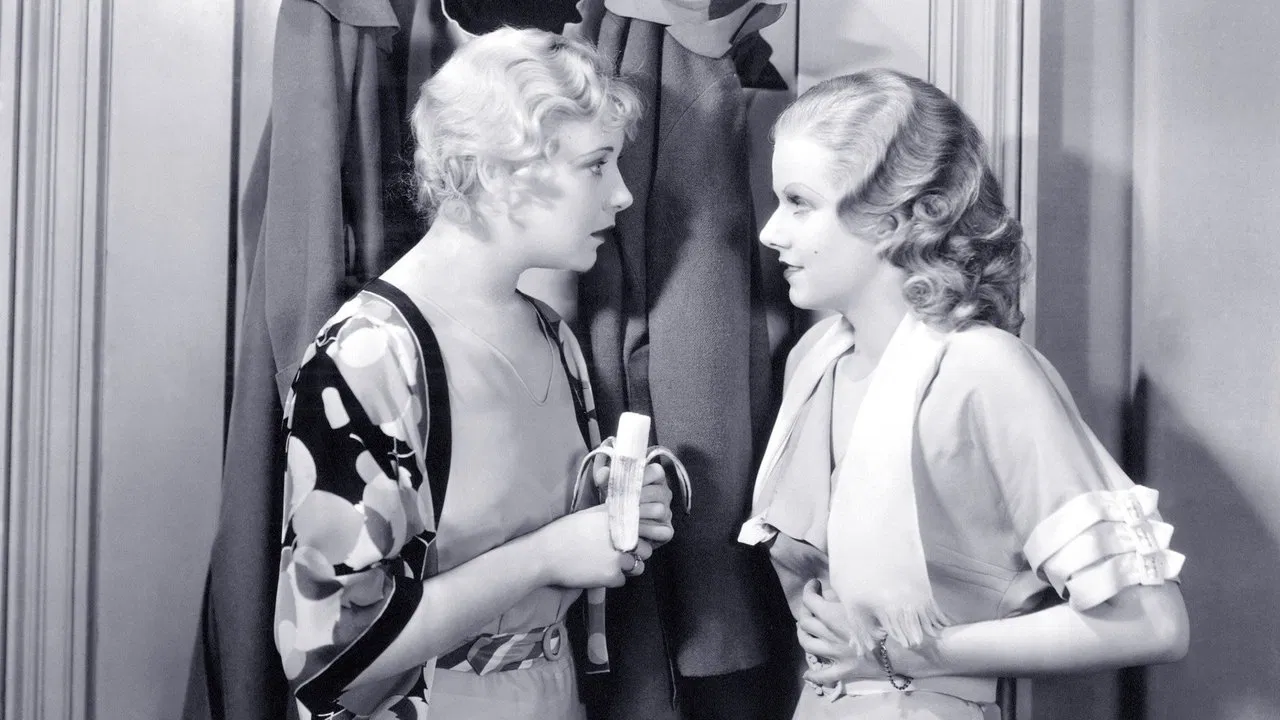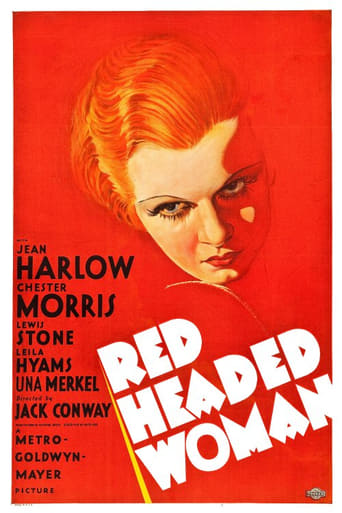

Ah, pre-code Jean Harlow, what a gift. I've studied her very short career and I much preferred her earlier work playing strumpets instead of the later attempts to make her a leading lady. Red-Headed Woman is her best film because she simply pulls no punches.Based on the book by Katherine Brush and adapted by Anita Loos, Red-Headed Woman finds the usually blonde Harlow playing carrot-topped Lil Andrews a happy, mischievous gold-digger who's hours of enjoyment come from withering the inhibition of married men. It is all an effort to climb the social ladder, of course, and she won't stop until she gets there. That's why she hooks up with Bill (Chester Morris), her boss, a happily married man who is passionately in love with his wife Irene (Leila Hyams) but who can't help himself when Lil throws herself into his arms. She convinces Bill to divorce Irene, not because she loves him but because it will get her in with the "in crowd". But Bill's society friends don't feel the need to associate with a tramp and Lil tires of her new husband and tries another target - his best friend Charles. He wants nothing to do with her but she marches ahead anyway and eventually he melts. Bill isn't so unhappy with the results because it gets Lil out of his hair and he can get down to the business of regrouping the shattered bits of his marriage to Irene.We understand what makes these men melt. We get that sense right from the beginning in a close-up of Harlow's gorgeous legs as she puts a tiny picture of Bill in her garter. She has a way with men by pushing herself against them. She doesn't lay back as an invitation, she thrusts herself upon her prey, kissing them and pressing herself against them like a predator. There's a look in her eyes and a tremble of her bottom lip, a turn of her hip that we sense she has worked to perfection. Her slight body, short stature and little girl voice suggest to her prey a woman who is naive and easily taken. She has a perfected way with men that makes even us in the audience tremble.There are not wounds to Lil, not shattered past that makes her this way. She's sexy, she likes and it and she likes what it does to men. Harlow displays such a joy at decimating a man's moral wall that for a while, we are happy to go along. We can't believe that these men would be such dopes but if you study her body language you can see the seductive power. Her performance is not that different from another gold-digger, the one played by Barbara Stanwyck a year later in a film called Baby Face. In that film, an equally trashy Stanwyck literally sexes her way from the gutter to the gold, seducing one man after another. But Stanwyck's Lily Powers had a reason for her machinations - she was trying to pull herself out of the gutter of prostitution provided by her no-good father. Harlow's character has no such reasoning, she just wants to get to the top because she has the organic tools to do so. She laughs at her seductive powers when they work but she gets vindictive when they don't.There is only one weakness in the film and that comes at the end. We meet up with Lil two years later at a horse track in Paris where she has taken a new lover and the film ends apparently (and abruptly) on the happy note that Lil's pursuits will continue. She has occupied our minds for two hours as such a destructive force that we want some sort of satisfaction and the film ends without a resolution. That doesn't speak to Harlow's performance just to some bad writing. Harlow's performance is an act of depraved giddiness but as the film goes along we begin to sympathize with those she is attempting to destroy. There comes a point at which every time she shows up in a doorway, we feel pity for anyone who tries to leave.
... View MoreJean Harlow plays a gold digger determined not to get stuck on the wrong side of the tracks and goes through men like tissues in an attempt to land a sugar daddy in "Red-Headed Woman."I've long since accepted that to watch a Jean Harlow movie you just simply have to agree to disagree with seemingly every moviegoer from the 1930s about Harlow's appeal. She was hot stuff back then, a fact that is nearly inexplicable to me now. In a role like this, when she's basically a slut, I can accept that men would want to have sex with her, despite the fact that she's actually quite ugly and uber-annoying to boot (ugh, that baby talk!) But that every man who comes across her would also want to dump his wife to marry her? That is pretty much impossible for me to get my head around.Though I will say that Harlow looks much more attractive with red hair than she does with that awful platinum blonde thing she sports in most of her movies. And while I don't find her remotely attractive, there is something about her that commands the screen."Red-Headed Woman" is not the raciest pre-Code movie I've seen, but it does manage to give a newbie some indication of how pre-Code movies were different from the ones that would be released in the couple of decades following. A movie made even five years later would never dream of letting Harlow's character get what she wants in the end without atoning for her sins first.Grade: B+
... View More"Red Headed Woman" released in 1932 by MGM, is all about Jean Harlow. Harlow came to MGM under the guide of Irving Thalberg, the boy wonder of the studio. Louis B. Mayer, a conservative man, initially wanted nothing to do with Harlow. He felt her image was that of a bimbo, but Thalberg held considerable power at the studio, and he made Harlow a star. In this film, one of several she made that year, Harlow plays a tough gal from the wrong side of the tracks. Her goal is to be rich, and she will use her "assets" to do so. Harlow sets out to seduce her boss (Chester Morris) who is very serious-minded and very married. Next thing you know, he's divorcing his wife and is now with Harlow. Not satisfied with this conquest, Harlow sets her sights on New York and shamelessly seduces a very rich (and yes, married) businessman (Henry Stephenson). It all gets quite complicated, with more men and eventually her husband getting wise to her games. But Harlow is a wonder here, with her tough talk and great accent, she rules the film. Matters such as marital infidelity and sex are not disguised, as this was two years before the code of 1930 would clamp down on the movie industry. In fact, this film was one of several which outraged the moralists and eventually lead to the 1934 censorship rules. Anyway, see the film for Harlow. Some good supporting performances, including Una Merkel as Harlow's wise-cracking friend, and Lewis Stone, playing Chester Morris' father.
... View MoreThis one’s similar to BABY FACE (1933) in that star Jean Harlow – forsaking her traditional platinum blonde look for the titular hair color – uses sex as her ladder into high society. However, it lacks the former’s power: for one thing, because we know nothing of her character’s background (so that she comes off as more of an egotistical “home wrecker”, as her own companion Una Merkel calls her) and also because it basically treats the subject as a comedy (complete with a wink-at-the-audience fade-out). In fact, the original script submitted by F. Scott Fitzgerald(!) was subsequently reworked by Anita Loos – best-known for the play “Gentlemen Prefer Blondes” (at which she even throws a dig in the film’s very opening line!).It’s interesting that the 3 titles in Warners’ Pre-Code collection all emanate from different studios: their particular style is immediately recognizable – this being an MGM production, it’s got none of the hard-hitting quality of Warners’ BABY FACE or even the stylized (yet delicate) Universal approach such as is evident in WATERLOO BRIDGE (1931). Rather it’s merely glossy, gratuitously naughty (witness Harlow’s fleeting nudity) and displays little cinematic inventiveness throughout! While the spunky Harlow is undeniably alluring, her character is so brazen and vulgar that it’s hard to believe a level-headed businessman as Chester Morris could really opt to leave his gorgeous wife (perhaps Leila Hyams’ best role) for her – even if Harlow’s clearly not one to take no for an answer! The film does descend into high-strung melodrama towards the end when Harlow, exposed for what she is, shoots Morris (but only manages to wound him).The supporting cast features established veterans May Robson (as Morris’ aunt), Lewis Stone (as his father) – both of whom are immediately suspicious of Harlow’s intentions – and Henry Stephenson (it was amusing to see him involved in undignified situations, for once, as a business associate of Stone and Morris captivated by Harlow’s wiles!). Also on hand is Charles Boyer in an early Hollywood role as Stephenson’s chauffeur: he promptly becomes Harlow’s lover, and the hilarious photo of the two kissing literally behind the back of his master/her husband is subsequently given much coverage! There’s even a delightful uncredited bit involving Henry Armetta (a much-used character actor of the day noted for playing flustered Italians) – here, he’s a complicitous waiter whom Morris bribes in order to hush up a chance meeting with Harlow in a phone booth! By the way, this had been shown on local TV several years ago but I didn’t catch it – since, back then, I was unaware of the film’s ‘risqué’ reputation; I’m glad that I was able to remedy this eventually because, while RED–HEADED WOMAN is undoubtedly the least substantial of the 3 titles in this collection, it’s easily the most enjoyable...
... View More